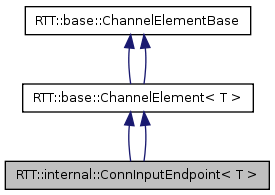#include <ConnInputEndPoint.hpp>

Public Member Functions | |
| ConnInputEndpoint (OutputPort< T > *port, ConnID *id) | |
| ConnInputEndpoint (OutputPort< T > *port, ConnID *id) | |
| virtual void | disconnect (bool forward) |
| virtual void | disconnect (bool forward) |
| virtual base::PortInterface * | getPort () const |
| virtual base::PortInterface * | getPort () const |
| virtual bool | inputReady () |
| virtual bool | inputReady () |
| virtual FlowStatus | read (typename base::ChannelElement< T >::reference_t sample) |
| virtual FlowStatus | read (typename base::ChannelElement< T >::reference_t sample) |
| ~ConnInputEndpoint () | |
| ~ConnInputEndpoint () | |
Private Attributes | |
| ConnID * | cid |
| OutputPort< T > * | port |
This is a channel element that represents the input endpoint of a connection, i.e. the part that is connected to the OutputPort
Definition at line 51 of file install/include/rtt/internal/ConnInputEndPoint.hpp.
| RTT::internal::ConnInputEndpoint< T >::ConnInputEndpoint | ( | OutputPort< T > * | port, | |
| ConnID * | id | |||
| ) | [inline] |
Definition at line 57 of file install/include/rtt/internal/ConnInputEndPoint.hpp.
| RTT::internal::ConnInputEndpoint< T >::~ConnInputEndpoint | ( | ) | [inline] |
Definition at line 60 of file install/include/rtt/internal/ConnInputEndPoint.hpp.
| RTT::internal::ConnInputEndpoint< T >::ConnInputEndpoint | ( | OutputPort< T > * | port, | |
| ConnID * | id | |||
| ) | [inline] |
Definition at line 57 of file rtt/internal/ConnInputEndPoint.hpp.
| RTT::internal::ConnInputEndpoint< T >::~ConnInputEndpoint | ( | ) | [inline] |
Definition at line 60 of file rtt/internal/ConnInputEndPoint.hpp.
| virtual void RTT::internal::ConnInputEndpoint< T >::disconnect | ( | bool | forward | ) | [inline, virtual] |
Performs a disconnection of this channel's endpoints. If forward is true, then the disconnection is initiated by the input endpoint. Otherwise, it has been initiated by the output endpoint.
Reimplemented from RTT::base::ChannelElementBase.
Definition at line 78 of file rtt/internal/ConnInputEndPoint.hpp.
| virtual void RTT::internal::ConnInputEndpoint< T >::disconnect | ( | bool | forward | ) | [inline, virtual] |
Performs a disconnection of this channel's endpoints. If forward is true, then the disconnection is initiated by the input endpoint. Otherwise, it has been initiated by the output endpoint.
Reimplemented from RTT::base::ChannelElementBase.
Definition at line 78 of file install/include/rtt/internal/ConnInputEndPoint.hpp.
| virtual base::PortInterface* RTT::internal::ConnInputEndpoint< T >::getPort | ( | ) | const [inline, virtual] |
Gets the port this channel element is connected to.
Reimplemented from RTT::base::ChannelElementBase.
Definition at line 91 of file rtt/internal/ConnInputEndPoint.hpp.
| virtual base::PortInterface* RTT::internal::ConnInputEndpoint< T >::getPort | ( | ) | const [inline, virtual] |
Gets the port this channel element is connected to.
Reimplemented from RTT::base::ChannelElementBase.
Definition at line 91 of file install/include/rtt/internal/ConnInputEndPoint.hpp.
| virtual bool RTT::internal::ConnInputEndpoint< T >::inputReady | ( | ) | [inline, virtual] |
This is called by an input port when it is ready to receive data. Each channel element has the responsibility to pass this notification on to the next, in the direction of the output.
Reimplemented from RTT::base::ChannelElementBase.
Definition at line 74 of file rtt/internal/ConnInputEndPoint.hpp.
| virtual bool RTT::internal::ConnInputEndpoint< T >::inputReady | ( | ) | [inline, virtual] |
This is called by an input port when it is ready to receive data. Each channel element has the responsibility to pass this notification on to the next, in the direction of the output.
Reimplemented from RTT::base::ChannelElementBase.
Definition at line 74 of file install/include/rtt/internal/ConnInputEndPoint.hpp.
| virtual FlowStatus RTT::internal::ConnInputEndpoint< T >::read | ( | typename base::ChannelElement< T >::reference_t | sample | ) | [inline, virtual] |
Reads a new sample from this connection This should never be called, as all connections are supposed to have a data storage element
Definition at line 71 of file rtt/internal/ConnInputEndPoint.hpp.
| virtual FlowStatus RTT::internal::ConnInputEndpoint< T >::read | ( | typename base::ChannelElement< T >::reference_t | sample | ) | [inline, virtual] |
Reads a new sample from this connection This should never be called, as all connections are supposed to have a data storage element
Definition at line 71 of file install/include/rtt/internal/ConnInputEndPoint.hpp.
ConnID * RTT::internal::ConnInputEndpoint< T >::cid [private] |
Definition at line 54 of file install/include/rtt/internal/ConnInputEndPoint.hpp.
OutputPort< T > * RTT::internal::ConnInputEndpoint< T >::port [private] |
Definition at line 53 of file install/include/rtt/internal/ConnInputEndPoint.hpp.